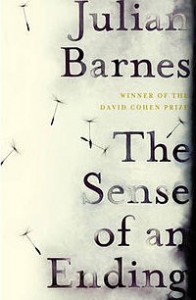This is a very well written book. Lucid and wonderfully perceptive, Barnes’ writing reminds me of McEwan’s.
The theme of the book is memory and how it creates a version of the past that doesn’t match up with other people’s versions or even one’s own version from a different time. That’s before ‘The Truth’ even comes into consideration. The blurb calls it ‘the story of one man coming to terms with the mutable past’.
I found the ending a little odd because some details are missing, leaving the reader to fill in the gaps using their imagination. At first I thought I had missed something but I found discussions about the conclusion on online forums expressing similar opinions to mine. However, I can forgive that since the book is a very good read; I was completely absorbed in the narrator’s journeys through his memories. The book strikes several nerves with me: I am painfully aware that I attempt to rewrite my own history (I suppose to try to save face) and I am always producing justifications for my illogical actions. Perhaps one day I will train myself to be more logical, like Mark is. In the meantime I will be very careful about what I say in all my written communications…
This is my favourite passage:
[Adrian] had a better mind and a more rigorous temperament than me; he thought logically, and then acted on the conclusion of logical thought. Whereas most of us, I suspect, do the opposite: we make an instinctive decision, then build up an infrastructure of reasoning to justify it. And call the rest common sense.
Of course it’s deliberate but reading through some bits of the book again, they are chillingly prophetic. This is one of Adrian’s speeches in a History lesson:
‘Indeed, isn’t the whole business of ascribing responsibility a kind of cop-out? We want to blame an individual so that everyone else is exculpated. Or we blame a historical process as a way of exonerating individuals. Or it’s all anarachic chaos, with the same consequence. It seems to me that there is – was – a chain of individual responsibilities, all of which were necessary, but not so long a chain that everybody can simply blame everyone else. But, of course, my desire to ascribe responsibility might be more a reflection of my own cast of mind than a fair analysis of what happened. That’s one of the central problems of history, isn’t it, sir? The question of subjective versus objective interpretation, the fact that we need to now the history of the historian in order to understand the version that is being put in front of us.’
(26th in 2012)
